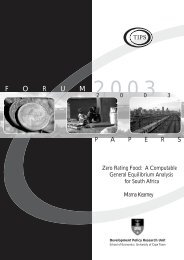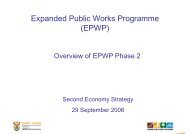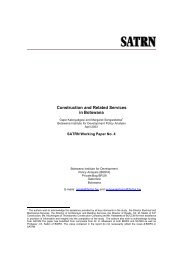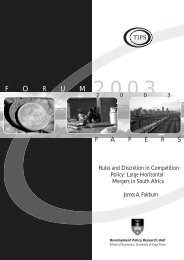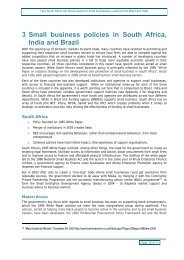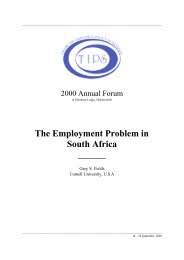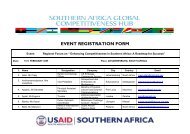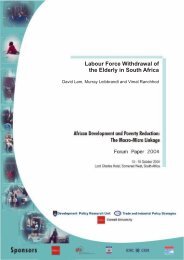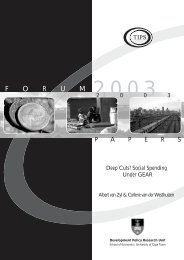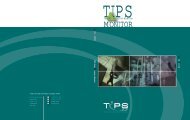Create successful ePaper yourself
Turn your PDF publications into a flip-book with our unique Google optimized e-Paper software.
ICT, culture and governance<br />
There are people who believe that cultural beliefs are hindrance to the adoption of<br />
ICT in many rural areas. These include Janczewski (1992), Rycken (1995), Manji et.<br />
Al. (1998),Qureshi (1998), Morales-Gomez & Melesse (1998) and Hasan & Dista<br />
(1999). Is this belief true? This might be caused by about ICT gap that occurs as a<br />
result of the vulnerability of people to ICT, and the time taken for generations to<br />
access ICT. It follows that there is an‘ICT-cultural gap that needs to be addressed.<br />
The question will be how to deal with this challenge.<br />
“If you are to conceal information to people, publish and give out those booklets”.<br />
This is true because people are lazy to read. It was also proved by Ryckeghem (1995)<br />
who said many Africans would prefer to consult colleagues or friends rather visit a<br />
library or documentation centre. He argued that how does one transform such an<br />
information culture, with IT, or internet?<br />
Is this the same ICT-culture problem that South Africans are experiencing. There<br />
might be many reasons underlying this problem. Some of these problems are lack of<br />
ICT access i.e. what Maji et al (1998) calls ‘information starvation’, acceptance to the<br />
level of poverty that people are living with, the flowing of ICT information to the<br />
people and resistance to change.<br />
Do South Africans, who do not have access to ICT, see this as ‘discrimination on<br />
access to information’. South African constitution addressed the right of access to<br />
information. Section 32. (1)of the consitutition says “ Everyone has the right of access<br />
to<br />
a. any information held by the state; and<br />
b. any information that is held by another person and that is required for the<br />
exercise or protection of any rights”.<br />
This is a challenge to South African government and the ICT sector in ensuring that<br />
all South African are accessing any ICT information in this country. How a country<br />
can manage this challenged? Myers (1998) found that only a small percentage of the<br />
sub-Sahara Africa’s population has access to ICT, and this denies them access the<br />
ability to realize their rights. He concludes by saying IT (with reference to computers)<br />
is thus capable of helping African citizens realise their basic rights by transmitting<br />
information on relevant issues and enhancing their knowledge in relation to new<br />
systems and programmes that can benefit the community and the nation as a whole.<br />
There are also ICT research gaps that need to be conducted in order to understand the<br />
levels of ICT literacy in South African population. This information is of importance<br />
for the decision makers and policy developers to base their decisions on. If the issues<br />
of ICT, culture and governance can be managed, is South African economy going to<br />
reap the fruits?<br />
12



